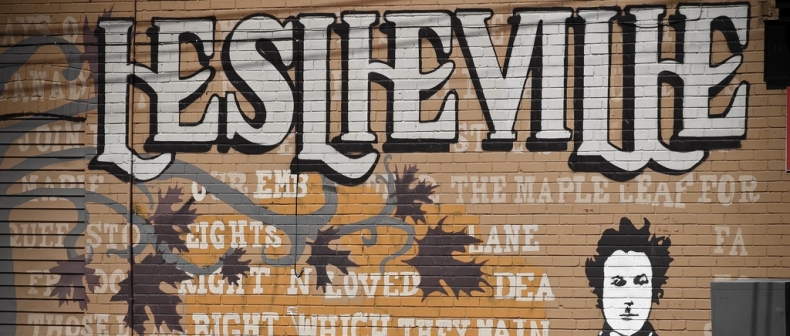
I’ve heard it said that Leslieville is Toronto’s Brooklyn. And sure, while you won’t stumble upon any 3am parties in abandoned Bushwick-esque warehouses, Leslieville is still ultra-cute and ridden with coffee shops – in that pleasantly-run-down-but-gentrified kind of way. It feels like something a little separate from the rest of the city (the Don Valley will do that), a formerly industrial neighbourhood of antique shops and hipster baby stores that almost couldn’t exist anywhere else.
I think of Leslieville as one of the most romantic spots in the city. When you take the streetcar heading east on Queen, you almost forget that the skyscrapers are just a few minutes west. You could spend days going the through old flea market collector shops, making up stories about the people who once possessed the floor length sleeveless fur vest you’re now trying on. It’s Kensington without the grit, Queen West without the Starbucks. Hint: Leslieville is incidentally an awesome place to go on dates.
Last week you took notes on how your brain responds to sex (and hopefully you performed some experiments, too). So all that oxytocin and anterior cingulate cortex activity got me thinking about sex’s romantic counterpart: the neural basis of love.
One of the first studies to look at love in the brain was conducted by neuroscientists Andreas Bartels and Semir Zeki at University College London in 2000. They recruited seventeen participants who professed themselves “truly, deeply and madly in love” (researchers’ words, not mine) and got them to look at pictures of their partners. And you guessed it, they did this while they lay down in the brain scanner. The researchers then compared this neural activity to the brain patterns that resulted when participants observed pictures of three friends of similar age, sex, and relationship duration to their partners.
What they found was somewhat surprising. Compared to when participants looked at their friends, the in-love brain lit up particularly in the medial insula and the anterior cingulate cortex (remember how the ACC lights up when you have an orgasm?). And while in previous studies these areas have been linked to things like looking at attractive strangers and feeling happy, the researchers noted that the particular subdivisions of these structures activated in their study didn’t quite overlap with previous work. (A good reminder of how complex the brain can be when you get down to details).
The results were surprising because the patterns of our neural response to love didn’t show much overlap with previous work on the brain and its response to various emotional states. Essentially, being in love has its own unique neural signature. In fact, the biggest overlap in neural states was found between the brain in love and the brain on drugs. Studies of cocaine and opioid-induced euphoria actually showed major overlap with all the areas that light up particularly to love – namely the insula, the caudate nucleus, and the putamen. Based on that connection, the researchers suggested that there could be a close neural link between romantic love and euphoric states. Not hard to believe.
Since then, research has focused on parsing apart the brain states related to various phases and types of romantic relationships. Your neural response to love will generally look different when you’ve been married ten years, versus when you’re still in hot-and-bothered honeymoon stage. For example, in the early stages of a relationship, participants show strong activation in their dopamine-mediated “reward” system (the stuff that lights up to pleasant things like food and sex). The good news is, the same can be true for people in long-term relationships – in other words, that pleasure factor can stay strong for decades (and not the 18 months to three years that Oprah decrees). It’s kind of nice to think that the feeling of super-excited, semi-obsessive love can last so long, and that there’s brain science to prove it. On top of that, participants in long-term relationships also show unique activations in areas involved in maternal attachment, which speaks to a different level of commitment long-term.
The same research has looked at the correlations between specific brain areas and things like obsession with one’s partner, levels of romantic love, levels of friendship-love, and frequency of sexual activity. That’s not to say that a neuroscientist could check out your brain scan and estimate how much sex you’re having – but the trends are there, and they’re interesting.
So when you’re strolling down Memory Lane (which is actually a little alleyway in Leslieville, just south of Queen Street East), give some thought to your anterior cingulate cortex, and maybe check in with your dopamine levels. If the neural signature matches, chances are you’re either on drugs or you’re in love.
____
Erene Stergiopoulos writes about brains and neighbourhoods for Toronto Standard. Follow her on Twitter @fullerenes.
For more, follow us on Twitter at @torontostandard and subscribe to our Newsletter.














